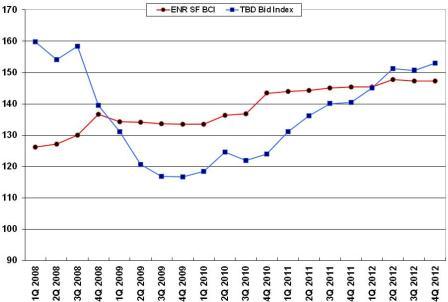

Printable PDF version
Subscribe to our newsletter
What is a PMO?
Budget Management
Project Managing the Economy
Construction
Management Specialists
111 Pine Street, Suite 1315
San Francisco, CA 94111
(415) 981-9430 (San Francisco office)
9705 Cymbal Drive
Vienna, VA 22182
(703) 268-0852 (Washington, DC office)
4361 35th Street
San Diego, CA 92104
(619) 550-1187 (San Diego office)
8538 173rd Avenue NE
Redmond, WA 98052
(206) 571-0128 (Seattle office)
www.TBDconsultants.com
Project management is important, but what is a PMO? What does it do, why might you want one, and what can you expect from one? We examine these questions and more here.
One important aspect of project management is budget management, and in this article we look as some of the areas that budget management encompasses, from the initial concept through to the completion of the project.
Project Managing the Economy
Geoff Canham, Editor
So, the election is over, and we now know who will be in charge for the next four years. But should we be saying ‘in charge’? Not really. Whatever political candidates may promise, the division of powers that is a fundamental point in the US Constitution means that the only way they could really ensure delivery of those promises would be to throw out the constitution and become a dictator, as President Morsi has been attempting in Egypt.
That means that we can expect similar political wrangling that we have been getting used to, but ending in last second compromises, and the economy will struggle on regardless.
And it seems that the economy has actually been doing fairly well. Consumer confidence has been improving, as we saw with the Black Friday rush on the shops, the housing industry continues to show improvement, as we discussed in our fourth quarter 2012 newsletter, and the unemployment situation continues to improve, even if it is depressingly slowly.
If we were to do some risk management on the economy, what are the risks and opportunities that we should look at?
The so-called Fiscal Cliff is one risk that hopefully will be resolved by the time this newsletter comes out, but at the time of writing (end of November) is still worrying the market. There is supposedly some movement towards a settlement, but this writer still believes that it will go to, or beyond, the last second before an agreement is reached. And if no agreement is reached, there are influential voices who believe the effects will not be as traumatic as the name implies. It would certainly help to start correcting the deficit problem.

The European situation is another serious risk to consider, and that has largely been brought about by their efforts at addressing the deficit problem in a political climate that is even more fractured than in the US. How Europe will resolve the problems is hard to see at present, but we can expect the can to be kicked down the road for a while yet.
China’s growth has been slowing recently, but it is still substantially greater than that of the US. The growth of the middle class in China is also having worldwide effects, making it less attractive for US and other worldwide companies to produce products there, but providing more potential customers for those same companies.
China leads us to another issue as well. Their population control is expected to result in an increasingly aging population, something that is also happening in the U.S. and Europe. That aging population will itself be a drag on the potential for growth, however, at the start of the recession a number of economists suggested that having low growth would be the best way to avoid the dramatic booms and busts.
Anyway, looked at overall, it seems as though slow but increasing improvement can be expected for the coming year.
We wish all our readers well for the New Year.
Design consultant: Katie Levine of Vallance, Inc.